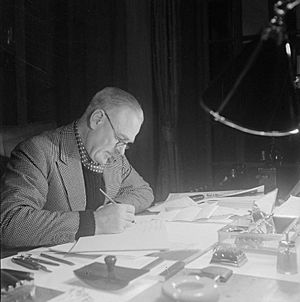Archibald Wavell, 1st Earl Wavell facts for kids
Quick facts for kids
The Earl Wavell
|
|
|---|---|
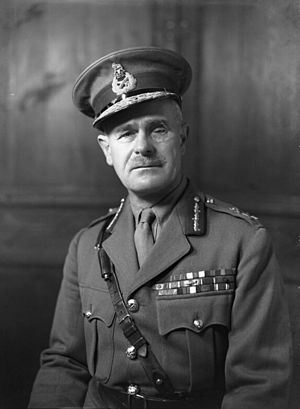
Sir Archibald Wavell in Major-General's uniform
|
|
| Viceroy and Governor-General of India | |
| In office 1 October 1943 – 21 February 1947 |
|
| Monarch | George VI |
| Prime Minister | Winston Churchill (1943–45) Clement Attlee (1945–47) |
| Preceded by | The Marquess of Linlithgow |
| Succeeded by | The Viscount Mountbatten of Burma |
| Member of the House of Lords | |
| In office 28 July 1943 – 24 May 1950 Hereditary peerage |
|
| Preceded by | Peerage created |
| Succeeded by | The 2nd Earl Wavell |
| Colonel of the Black Watch | |
| In office 1946–1950 |
|
| Lord Lieutenant of the County of London | |
| In office 1949–1950 |
|
| Preceded by | The Duke of Wellington |
| Succeeded by | The Viscount Allanbrooke |
| Constable of the Tower of London | |
| In office 1948–1950 |
|
| Preceded by | The Lord Chetwode |
| Succeeded by | The Lord Wilson |
| Personal details | |
| Born |
Archibald Percival Wavell
5 May 1883 Colchester, Essex, England |
| Died | 24 May 1950 (aged 67) Westminster, London, England |
| Spouse |
Eugenie Marie Quirk
(m. 1915) |
| Children | 4, including Archibald Wavell, 2nd Earl Wavell |
| Military service | |
| Allegiance | United Kingdom |
| Branch/service | British Army |
| Years of service | 1901–1943 |
| Rank | Field marshal |
| Unit | Black Watch (Royal Highland Regiment) |
| Commands |
|
| Battles/wars | |
| Awards |
|
Field Marshal Archibald Percival Wavell, 1st Earl Wavell (born May 5, 1883 – died May 24, 1950) was a very important officer in the British Army. He fought in several wars, including the Second Boer War and the First World War. During the First World War, he was injured at the Second Battle of Ypres.
In the Second World War, he first led British forces in the Middle East Command. He won battles against the Italians in North Africa. However, his forces were later defeated by the German Army. He then became the Commander-in-Chief in India and later the Viceroy of India until he retired in 1947.
Contents
Early Life and Education
Archibald Wavell was born in Colchester, England. His father was also a military officer. Archibald went to several schools, including Winchester College and the Royal Military College, Sandhurst. Sandhurst is a famous military academy where future army officers train.
Starting His Military Career
After finishing at Sandhurst, Wavell joined the British Army in 1901. He became a second lieutenant in a famous Scottish regiment called the Black Watch.
Fighting in South Africa and India
Wavell went to South Africa to fight in the Second Boer War. After the war, his regiment moved to British India. In 1908, he fought in the Bazar Valley Campaign in India.
Learning and Observing Abroad
In 1909, Wavell attended the Staff College to learn more about military strategy. He was one of the best students there. In 1911, he spent a year in Russia to learn the Russian language and observe their army.
First World War Experiences
When the First World War started, Wavell was working as a staff officer. He was sent to France to join the British Expeditionary Force.
Injury and Recognition
In 1915, during the Second Battle of Ypres, Wavell was wounded and lost his left eye. Despite his injury, he showed great bravery and was awarded the Military Cross. This award is given for acts of courage during battle.
Working with Other Armies
After recovering, Wavell continued to work as a staff officer. He served as a liaison officer with the Russian Army in the Caucasus and later with the Egyptian Expeditionary Force. He helped different armies work together.
Between the World Wars
After the First World War, Wavell continued his military career. He held various important positions, even though many officers faced lower ranks during peacetime.
Leading Troops and Training
He commanded the 6th Infantry Brigade and later the 2nd Division. He also served as an aide-de-camp (a personal assistant) to King George V.
Challenges in Palestine
In 1937, Wavell was sent to Palestine because there was growing unrest. He became the General Officer Commanding (GOC) of British Forces there. In 1939, he was given command of the Middle East Command.
Second World War Military Commands
Leading in the Middle East
When Italy joined the Second World War in 1940, Wavell faced a big challenge. His forces in the Middle East were much smaller than the Italian forces. He decided to hold back and build up his strength.
Victories in North and East Africa
In December 1940, Wavell launched a successful attack into Libya called Operation Compass. His forces defeated the Italian Tenth Army and captured many prisoners. His troops also pushed back the Italians in Eritrea and Ethiopia.
Setbacks and Changes
However, in February 1941, Wavell was ordered to send some of his troops to Greece to fight the Germans. He disagreed with this, but he followed orders. This decision led to difficulties. The Germans sent their Afrika Korps to North Africa, and Wavell's weakened forces were pushed back. The campaigns in Greece and Crete also ended in British withdrawals.
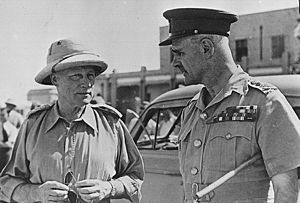
The British Prime Minister, Winston Churchill, was not happy with some of Wavell's decisions. After another failed attempt to relieve the siege of Tobruk, Churchill decided to replace Wavell with Claude Auchinleck in June 1941.
Commander in India
Wavell then became the Commander-in-Chief, India. This meant he was in charge of all British forces in India. His responsibilities also included Iraq and Persia (modern-day Iran). He worked with the Russians to secure oilfields and supply routes.
Facing the Japanese Threat
In December 1941, Japan entered the war, and Wavell's command became a major war zone. He was put in charge of ABDACOM, a combined force of American, British, Dutch, and Australian troops.
Challenges in Southeast Asia
Wavell faced tough battles against the Japanese in Malaya and Burma. The Japanese forces were very strong, and the Allies had to retreat to India. In 1943, Wavell was promoted to Field Marshal, the highest rank in the British Army.
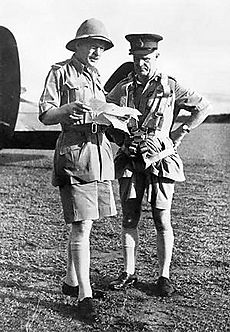
Viceroy of India
In 1943, Wavell was offered a new and very important role: Viceroy of India. The Viceroy was the highest British official in India, acting as the King's representative. He was also given the title of Viscount Wavell.
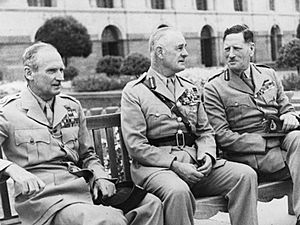
Addressing Challenges in India
One of Wavell's first tasks was to deal with the terrible Bengal famine of 1943. He ordered the army to help distribute food to people who were starving.
During his time as Viceroy, India was going through big changes. Gandhi was leading the Quit India movement, asking for India's independence. Mohammad Ali Jinnah was working to create a separate country for Muslims.
Working Towards Independence
Wavell tried to help India move towards independence with plans like the Wavell Plan and the Simla Conference. However, he didn't get much support from the British Prime Ministers, Winston Churchill and later Clement Attlee, who had different ideas about India's future.
As the war ended, people in India expected independence, and there was more violence between different groups. Eventually, in 1947, Attlee decided to replace Wavell with Lord Mountbatten.
Later Life and Legacy
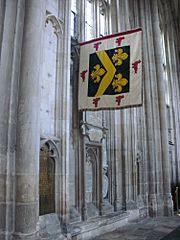
After returning to England in 1947, Wavell was given the title Earl Wavell. He was also made the Constable of the Tower of London, a historic role.
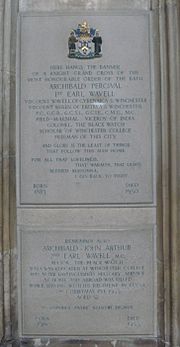
Wavell loved books and poetry. While he was Viceroy of India, he put together a collection of his favorite poems called Other Men's Flowers. He had an amazing memory and could quote many poems by heart.
Archibald Wavell passed away on May 24, 1950. His funeral was a special military ceremony held at Westminster Abbey. He is buried in the cloister at Winchester College.
Family Life
Archibald Wavell married Eugenie Marie Quirk in 1915. They had four children. His son, Archibald John Arthur Wavell, became the 2nd Earl Wavell but sadly died young in 1953.
Honours and Awards
Wavell received many awards and honors for his military service and leadership. These include:
British Awards
- Military Cross (1915)
- Companion of the Order of St Michael and St George (CMG) (1919)
- Knight Grand Cross of the Order of the Bath (GCB) (1941)
- Knight Grand Commander of the Order of the Star of India (GCSI) (1943)
- Knight Grand Commander of the Order of the Indian Empire (GCIE) (1943)
- Knight of the Order of St. John (1944)
International Awards
- Order of St Stanislaus, 3rd class with Swords (Russia) (1916)
- Croix de Guerre (France) (1920)
- Commander, Légion d'honneur (France) (1920)
- Grand Cross, Order of George I with Swords (Greece) (1941)
- Virtuti Militari, 5th Class (Poland) (1941)
- Legion of Merit degree of Chief Commander (United States) (1948)
Quotes
- "I think he (Benito Mussolini) must do something, if he cannot make a graceful dive he will at least have to jump in somehow; he can hardly put on his dressing-gown and walk down the stairs again."
- "After the 'war to end war', they seem to have been pretty successful in Paris at making the 'Peace to end Peace.'" (This quote was about the peace treaties after the First World War.)
- "Let us be clear about three facts: First, all battles and all wars are won in the end by the infantryman. Secondly, the infantryman always bears the brunt. His casualties are heavier, he suffers greater extremes of discomfort and fatigue than the other arms. Thirdly, the art of the infantryman is less stereotyped and far harder to acquire in modern war than that of any other arm."
Images for kids
See Also
 In Spanish: Archibald Wavell para niños
In Spanish: Archibald Wavell para niños
- The Wavell School
 | Sharif Bey |
 | Hale Woodruff |
 | Richmond Barthé |
 | Purvis Young |


